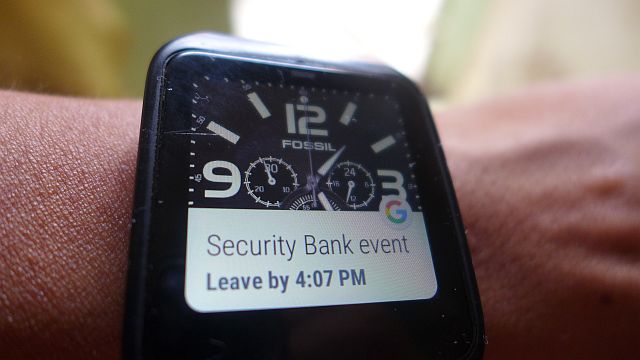TIME to run, the phone nudges me out of the bed, triggering a vibrating alarm on my watch. While suiting up and preparing my first cup of coffee, a suite of apps provides me my morning briefing: the biggest stories to break overnight and my schedule for the day, complete with driving routes.
I head out for my morning run, tracked by an Android Wear watch. I used to run with a phone but with today’s unpredictable weather, I lost one to water damage.
When I get back to the house, the Android Wear watch connects to my phone and logs details of the run – kilometers, pace, GPS locations – for uploading to Strava and Runkeeper, where it is measured against my monthly goals. The number of steps I took and the time of the run accrues to my daily target of 10,000 steps and 90 minutes of active time on Google Fit.
Throughout the day, Google Now alerts me via phone and on the watch about things the system thinks I ought to know. “Leave now,” one such notification buzzes me on the watch, “for your 2:30 p.m. meeting.”
The notification was sent an hour ahead because Google Now detected traffic congestion on the best driving route to the place.
We now live in a time of unprecedented data collection and processing to produce such personal insights as the optimal time for one to leave for a meeting or date. All these are centered on a powerful device -the mobile phone.
Calling is the least of the things we do today on the phone. The device has morphed into our generation’s personal computer: a device with more processing power and storage than the desktop PCs of a few years back.
For lawyer Donn Rabanes, his most useful app is that of Weather Underground, which he describes as providing accurate reading. He has been using it for five years. The data is useful, he said, for planning his sports activities.
For designer Butch Carungay, communication apps are key. He cites WhatsApp and Viber as key applications especially when communicating with his direct reports and other work contacts.
Gerald Yuvallos, co-founder of Istorya.net, lists Google Drive, Gmail and Google Analytics as important. He uses Analytics to monitor the performance of his sites and that of his clients.
Since he needs to be able to log into servers he is managing, he often uses terminal apps. On mobile, he uses JuiceSSH for emergencies.
Here are other apps you should check out:
Google Now Launcher
This Android home screen replacement is more than a cosmetic change, it enhances the functionality of your phone with the easy access to Google Now, which provides you important information you’d need throughout the day. It’s minimal and clean look is a bonus.
Mobile e-mail
With e-mail an important functionality of phones, a good app is a must-install item. Outlook on mobile is among the best multi-account free email app. It’s easy to use, offers various functionalities such as swiping to snooze an email for some other time. It also has calendar integration that will allow you to easily schedule appointments via email. Another good email app to check out is Inbox by Gmail.
Fitness
If you run or cycle and use an Android watch to track your mileage and pace, Ghostracer is a good free app. For Sony Smartwatch 3 users and its on-board GPS, it’s the best option.
It allows you to automatically sync your workout or training data to RunKeeper and Strava. If you just use a phone to track your workouts, RunKeeper is a good option.
For general fitness and activity tracking, Google Fit does the job really well. You can set a daily target such as 10,000 steps or 90 minutes of activity and it will track it for you, daily, weekly and monthly.
Documents
For writing notes, managing spreadsheets or other documents, Google Drive is the best option on mobile. It simplifies archiving and management because you don’t have to save anything, the documents are accessible from anywhere via your Google account and through its suite of apps like Docs, Sheets and Slides.
For general note-taking, Evernote is probably the best option. It certainly is better than Microsoft OneNote, even if the latter is free. Evernote is among the handful of apps I pay for / MAX LIMPAG


